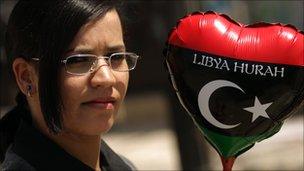Is overthrow of Gaddafi a new type of intervention?
- Published
- comments

A woman holding a balloon with the colours of the rebellion's flag and the slogan 'Free Libya
The overthrow of Colonel Muammar Gaddafi is billed by many as a new form of intervention.
Some regard it as an unprecedented use of air power to achieve foreign policy goals, and others, such as Lord Ashdown have opined that this type of operation, without boots on the ground, could set the pattern for future actions by cash-strapped, conflict-bruised, western countries.
There is some force in these analyses - though I'm bound to quibble at suggestions that 'intervention lite' is in itself a new strategy - but it is usually the case that overthrowing or destroying something is easier than building.
The Libyan revolution is still very young, with rival brigades of armed militiamen staking out turf in Tripoli, so you could argue that the current optimism mirrors the mood in Baghdad in April 2003 when Saddam Hussein had been overthrown and some were marvelling at how easy it had all been.
A victory of airpower in unseating a system of government is not unprecedented. The 1999 Kosovo air campaign was a similar exercise, freeing that province from Serbian rule after a blitz in which the use of ground troops had been vetoed from the start by the White House.
There are parallels with the toppling of the Taliban in 2001 too, an exercise achieved by US air power, its local allies on the ground (i.e. Afghan fighters of the Northern Alliance), and a few score special forces.
We do not know yet exactly what the presence of foreign troops on the ground in Libya has been, but one can hardly describe it as an intervention without boots on the ground. There have undoubtedly been some special forces operations, the UK and France have had military advisory missions in Benghazi since the spring, and some other countries such as Qatar have sent military training teams.
'Political heat'
Add this to the air strikes, and you have a sense of 'ownership' of the Libyan situation that the main architects of the campaign can hardly escape.
The National Transitional Council (NTC) says it does not want foreign troops to help keep the peace. Nato and Gulf foreign ministers, are hoping that offers of technical know how and freeing up billions in frozen state cash will be enough to secure the situation and help the Libyans build their own future. Optimists see cash and the avowed democratic wishes of the NTC as sufficient to underpin it.
However, it has already become clear from the revolutions in neighbouring Tunisia and Egypt that once the old dictator has gone, goodwill soon fractures between elements of the coalition that brought him down.
If that produces political heat it is not a problem, but in Libya there are now guns everywhere, scores to be settled, and security forces that have imploded. In Tunisia and Egypt the army remains visibly in charge, containing the political passions of the moment, acting as strong national institutions.
So the destruction of the Gaddafi regime has been achieved and this fact alone confounds some of the naysayers.
As for the next few months, the UK and France can expect limited influence over what happens - that's what you get with 'intervention lite' - but considerable exposure to political risk. Last month's assassination of the rebel commander General Abdul Fateh Younis may have been a grim portent.
If the lawlessness worsens, and the country becomes a playground for feuding tribal gangs, some people are bound to hold the foreigners responsible.
There are good reasons why Libya should be able to pull itself up in the coming months - not least the positive spirit, and yearning for democracy, that its people have shown since the February revolution.
But if it all goes wrong many will argue that the western intervention was less a pattern for future intervention, than a throwback to those colonial episodes of the 19th Century in which gunboats were sent to punish corsair chieftains on the Barbary Coast but soon withdrew to let the locals fight it out for themselves.